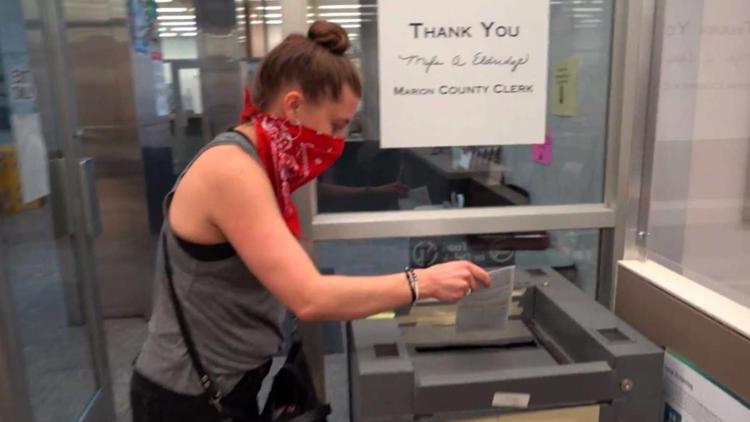INDIANAPOLIS — We are less than 100 days before the November election and on Thursday, President Trump suggested via Twitter that it be delayed.
"With Universal Mail-In Voting (not Absentee Voting, which is good), 2020 will be the most INACCURATE & FRAUDULENT Election in history," Trump began. "It will be a great embarrassment to the USA. Delay the Election until people can properly, securely and safely vote???"
In April, presumptive Democratic presidential nominee Joe Biden said, “Mark my words, I think he is going to try to kick back the election somehow, come up with some rationale why it can’t be held.”
This is not an isolated case of the injection of doubt in what has become a cornerstone of American democracy: The national election and a peaceful transfer of power.
Throughout the 2016 election, candidate Trump suggested it would be "rigged." After he won the Electoral College but trailed Hillary Clinton by about 2.8 million in the popular vote, he suggested widespread "fraud" despite taking the oath of office, alleging there were "three to five million people" who had "voted illegally."
This past month, Fox News Sunday host Chris Wallace asked Trump why he opposed mail-in voting, which a half dozen states routinely do, with half a million Hoosiers joining them in the delayed June 2 primary when the state allowed no exclusive absentee voting with no illegality. “I think mail-in voting is going to rig the election,” Trump responded. “I really do.”
When Wallace pressed him on whether he will accept the results of the 2020 election, President Trump responded, “I have to see. I’m not going to just say yes. I’m not going to say no.”
His son-in-law, presidential adviser Jared Kushner, was asked by TIME magazine last spring if Trump would try to delay the election. “I’m not sure I can commit one way or the other, but right now that’s the plan,” Kusher responded, observing that the coronavirus pandemic could have an impact. “Hopefully by the time we get to September, October, November, we’ve done enough work with testing and with all the different things we’re trying to do to prevent a future outbreak of the magnitude that would make us shut down again.”
In May 2017, President Trump appointed Vice President Mike Pence to head the Presidential Advisory Commission on Election Integrity. Included on that panel was Indiana Secretary of State Connie Lawson. It disbanded after 11 months, with U.S. News & World Report observing: Charles Herndon, White House director of information technology, said in a sworn court declaration filed ... in federal court that the voter-fraud commission "did not create any preliminary findings."
I asked Secretary Lawson in August 2017 if she believed there was any sort of widespread vote fraud in 2016. “The election results are absolutely unaltered and no votes have been changed,” Lawson said. How does Lawson process President Trump’s claims of widespread voter fraud as a commission member? Lawson explained, “Of the numbers I heard, three to five million fraudulent votes, we have no evidence of that here in Indiana.”
With the pandemic wreaking havoc on many aspects of our lives, this injection of doubt in such a vital institution to democracy is simply reckless governance.
Trump and Pence have been going around the nation telling state governments and schools that it is safe to reopen. What, then, is the rationale to delay the election? Perhaps it's because a number of national and battleground state polls show they are losing.
President Lincoln faced uncertain reelection during the Civil War in 1864, and some suggested that the presidential election be postponed. After four years of secession, insurrection and armed conflict that claimed hundreds of thousands of lives, Lincoln had ample reason to delay an election many thought he would lose.
“It has long been a grave question whether any government, not too strong for the liberties of its people, can be strong enough to maintain its own existence in great emergencies,” Lincoln said. “But, the election was a necessity. We can not have free government without elections; and if the rebellion could force us to forego, or postpone a national election it might fairly claim to have already conquered and ruined us.”
As the polls closed on Nov. 8, 1864 on a gloomy, rainy day in Washington, author Carl Sandburg described the nation of one of "chaos, suspicion, mistrust, vengeance, dark doubts were in the air, but the marking, handling, counting of the ballots went on in quiet and good order, fraud and violence showing only in minor incidents.”
"I am just enough of a politician to know that there was not much doubt about the result of the Baltimore convention," he said of his Republican nomination, "But about this thing I am very far from being certain. I wish I were certain." At the War Office that evening, Lincoln said, "I earnestly believe that the consequences of this day's work ... will be to the lasting advantage, if not to the very salvation, of the country."
For all of us who love freedom, democracy and our nation, we should dedicate ourselves to doing all we can to open the polls this October and November on time, in good order and with fairness.
The columnist is publisher of Howey Politics Indiana at www.howeypolitics.com. Find Howey on Facebook and Twitter @hwypol.



